
January 2005 Guitarist of the Month
Marilyn Mitchell and Sarafina Maraschino of LIPSTICK CONSPIRACY
Interview for GAY
GUITARISTS WORLDWIDE
by Robert Urban
One of the fastest-rising bands in America, and spear-heading the phenonmenal explosion of "T-girl" rock acts - LIPSTICK CONSPIRACY is set for a massive spring 2005 U.S. tour. Formed in 2003, the band continues to celebrate their 2004 debut CD, "Don't Tell A Soul" . Their audience base increased dramatically following their stellar performances at Bay Area Pride festivals, their penetration of the local media, and the addition of a fifth member, Emme Yarwood. Lipstick Conspiracy now rides a new wave of notoriety largely fuelled by the fact that the San Francisco Bay Guardian named them the BEST GIRL BAND 2004 for the Best of the Bay. This distinction drastically increased their social capital, which was demonstrated when PlanetOut named them Featured Artist. The remainder of 2004 saw Lipstick Conspiracy, the so-called "band with the plan" continually on the run. They avoid the limelight, and are difficult to obtain on radar, but can be heard on radio everywhere. They are rumored to be armed and extremely fabulous. Band guitarists MARILYN and SARAFINA graciously offer insights into their lives and work in our exclusive GGW interview below.
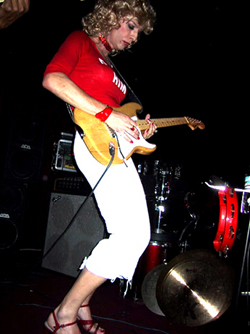
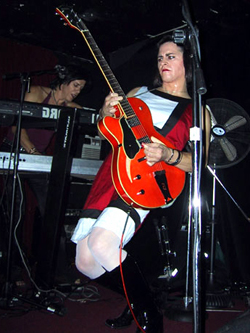
What brand/model/year instrument(s) do you record and play out with?
Marilyn: (pictured on left) I play bass guitar and also lead guitar on some songs in the band. My bass guitar is a 2004 Fender Precision Bass and my other is a Fender Stratocaster 1970 reissue. I record and play out with both.
Sarafina: (pictured on right) My main guitar is a 2003 Gretsch Historic hollow-body, with cats'-eye cutout holes. Occasionally, I use my 1984 Ovation Ultra. Both were used on our debut album, “Don't Tell A Soul. him though!)What brand/model/year amps and effects do you use?
Marilyn: For my Stratocaster, I use a Mosvalve power amp (160 Watts).I have ADA Splitstack speakers (100 Watts, 8 Ohms per cabinet) that can be used for stereo effect on stage. I also use an ART digital multieffects unit, a Sabine Rack Tuner and a Morley (Little Alligator) volume pedal. In addition, I use an ADA midi-controller foot pedal (with 9 banks). For my Fender Precision Bass, I use an Ampeg amplifier.
Sarafina: My amplifier is a 1990 Carvin SX-200. 200 Watts, two 12” speakers. As for effects, I tend to lean on Boss (Overdrive, Distortion, and Tuner), but also use an Ibanez Digital Delay, and a Vox Wah Wah pedal. Each is of assorted vintage.
Any special/favorite instrument tones/effects/approaches/techniques you used/discovered in recording and/or performance that you really like?
Marilyn: Nothing extraordinary. I actually am just learning to do a better job at programming my effects and also utilizing my volume pedal more effectively particularly for live performances. I have tended to use a few of the pre-programmed settings of my multieffects units but I need to do more exploration because the unit is almost unlimited in the effects that can be produced.
Sarafina: Well, I tend to use the same distorted tone, and modify it by altering the delay and wah wah settings.
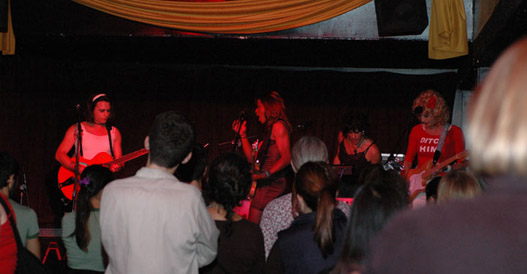
Who are your main influences as an instrumentalist? Which artists? Which bands? Which artists/bands were your favorites in your youth?
Marilyn: George Harrison, Jimi Hendrix, David Gilmour, Gordon Lightfoot. Harrison for his ability to come up with simple, catchy hooks, Hendrix for bringing out the wonder of it all, Gilmour for showing how emotion can be achieved on a guitar and Lightfoot for his rhythm guitar playing. I'm most impressed with Lennon and McCartney and Sting for song writing ability. I loved the Beatles, Police, Nirvana, Pink Floyd the most when i was growing up.
Sarafina: Growing up, I listened to a lot of 1960s music that my parents had lying around: the Beatles, Duanne Eddy, Glen Campbell, Peter/Paul&Mary, and so forth. Very influential for me. My principal influence as I grew older was easily Paul Westerburg of the Replacements. Other guitarists of note to me were Tom Verlaine of Television, Marty Wilsson-Piper of the Church, Doug Martsch of Built to Spill and Issac Brock of Modest Mouse.
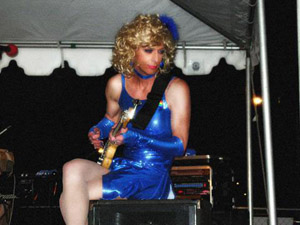
How many different kinds of stringed/fretted instruments do you play? (e.g. - guitars, banjos, mandolins, basses, etc.) Do you play any other instruments?
Marilyn: Mostly electric and acoustic six string guitar and 4 string bass. I can play harmonica but I haven't impressed my band enough to incorporate this into our music, yet! I also play a little piano, and I mean little!
Sarafina: Electric and acoustic guitars are definitely my mainstay. But, I have noodled around with other strings: steel, bass, banjo, fiddle, piano, and even this goofy Russian guitar that one of my neighbors owned. One of my ambitions is to develop as a pedal steel player, as soon as I can afford one.
Do you play/compose/record only your own original music? Do you do any other work in music‚ (e.g. teaching, recording session work, hired gun, producing, etc.?) Does your playing appear on recordings of any other artists?
Marilyn: In the band, we play most mostly originals written by the band members. Before I joined the band, I recorded my own material for several years. At this point, I am completely devoted to the band and have no other music work outside of the band. I have not played on recordings of other artists.
Sarafina: I've recorded with a variety of other musicians before, but mostly for online or private projects. My last band was in the midst of recording our debut when we imploded for personal reasons.
Is there a particular favorite solo or part you played on a recording, or a certain piece of composed music you wrote, that you feel represents your finest work?
Marilyn: Nothing that sticks out. I approach each song with the attitude of trying to come up with a solo that is catchy but also fits the song. I think I have a pretty good knack for doing this but I'm amazed how long it takes sometime to come up with something that both I AND my bandmates think is good. But I love the process of figuring it out. It's like a puzzle, but once you have it, bingo! Getting feedback from my bandmates has been very helpful in this process. Over my life, I've probably written over a hundred songs. I'm proud of several of them. I wrote “Just a Girl” soon after I joined the band largely as an idea from some transgender friends of mine who said that if you are going to be in a new transgender band, then you need to write a song that helps define who you are, how you feel, and to some extend what the band is about. I think this song does 'approach' meeting these objectives, not perfectly, but reasonably close, at least from a somewhat whimsical point of view.
Sarafina: Well, I am partial to some of my lead guitar work on our debut album, but it clearly isn't my finest work. As for songs that I've composed or been involved with the composition, I would have to say that one of my finest moments is the lyrics that I wrote for our song “Wishing Well.” Shawna Love brought the riff, while Marilyn developed it as a song. I added a pastiche of lyrics that I intended to convey some basic tenets about taking risks with your life for your own good. I think I succeeded. Unfortunately, we didn't get around to recording it in time for the debut CD.
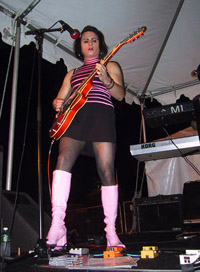
Any special thoughts on your instrument, and what it's meant to you in your life?
Marilyn: Well, I have to talk separately about my Fender Precision Bass and my Fender Strat. Before I joined this band, I really only played bass guitar on my recordings and had very little experience. Once I joined the band, I have played bass on many of the songs and I love it. I have learned a lot about the technique of playing bass from my bandmate Shawna Love, who is an awesome bass player, and from Tori Tait, to some degree. Tori probably has the most musical theory of anyone in the band, and her knowledge has helped my bass playing to some extent. Years ago, I realized that a band was not solid without good percussion and bass. As a band, we have worked very hard at trying to sinc up the bass and the drums, and this has become even more exciting now that we have our new drummer, Emme Yarwood. I love working with her at trying to achieve this synergy between her drums and my bass playing. My Fender Strat is a new purchase for me. My Fender Mustang that I bought in college a long time ago, was recently stolen out of my car in San Francisco. I almost died. But I immediately decided that I was ready to move to a Strat, and I'm very happy about it. It took awhile to get use to the frets, but now I love it. And I love the various tones it can produce. For both of my guitars, I decided to go for the natural wood finish, primarily so that both guitars will compliment the color of almost any dress I wear on stage!
Sarafina: My Gretsch is one of my favorite possessions. It was a gift to me from my partner, once it was clear that Lipstick Conspiracy was here to stay. I had always wanted a hollowbody, but I never thought that the big, clumsy guitars with the F-holes were very girlie. Until I saw the orange Gretsch Historic, with the cats' eye-holes. Gorgeous, and it goes with any dress I wear!
Can you relate any special feelings or experiences about being a glbt player in the mostly straight music world - especially regarding your formative/learning years on your instrument?
Marilyn: Well, I kind of think Sarafina will have a beautiful response to this question because she started our band. I discovered that I was transgender relatively late in life, only about 7 years ago, unlike many who knew when they were kids. I have played guitar since I was thirteen, but only as a transgender girl in the last few years. I knew eventually that I wanted to do something positive with my feminine side, and I just feel I am one of the luckiest people in the world to be in Lipstick Conspiracy. I know that we have, in our short two-year existence, already been an inspiration to other transgender artists. And this is wonderful. I also know, that music is a tough business even for straight people, let alone transgender. As a band, we have overcome many obstacles and issues and I know that more are on the way. My only hope is that as a band we will continue to love each other, and try not to let the frustrations that we have had and will have, get in the way of our burning desire to make an impression in the musical community. I think we all know that ultimately to do this, we will have to show the world that we are not a gimmick, and certainly not the drag queen types that dress up as women just for entertainment. We are transgender girls first and foremost, and we just happen to be in an all transgender rock band.
Sarafina: Gosh, I think that that was a good response! As for being trans, yeah, I have to agree with Marilyn's assessments. It's interesting, as there really is no roadmap for us to follow. There never has been an all transgendered rock band before. We've been compared to the New York Dolls, but that's not really the same thing. As for special feelings or experiences, I'd like to add that it is truly wonderful to think that my music is so intertwined with my transgendered status. Not everyone can see such integration in their lives. I'm very thankful.
center photo - left to right - LIPSTICK CONSPIRACY is: -
Shawna Love Vocals, lead/rhythm guitar, bass guitar Tori Tait Keyboards, programming, vocals Emme Yarwood Drums, percussion
Marilyn Mitchell Vocals, bass guitar, lead guitar Sarafina Maraschino Vocals
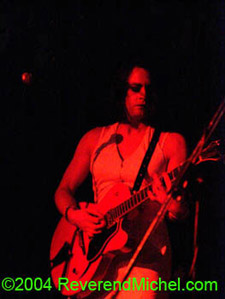
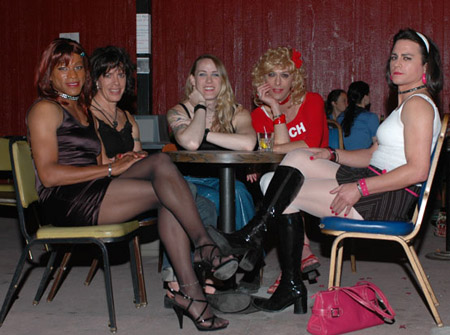
For a glbt player‚ how does the overall music scene differ today from years ago?
Marilyn: When we first started two years ago, there was very little, at least what I would consider transgender. A largely drag queen band, Pepper Spray, in San Francisco were playing several clubs in the city and achieved a nice following and notoriety in the Bay Area. Another good band, Blue Period, featured a transgendered lead singer. Honestly, before I joined the band, I simply didn't follow the GLBT scene that much. But now, I think transgendered artists anyway, are starting to come out of the closet. I have to think that we have helped a little in facilitating this process. Sarafina: Agreed. I was very surprised to find that there weren't more trans artists out there in the first place. I was aware of some artists, but most were soloists, and none seemed to enjoy much commercial success. That might change. We have seen a lot more come out of the woodwork since. Being told that we are an inspiration is staggering.
Any advice for young glbt/trans players?
Marilyn: I say work on your skills, musically and vocally. Get the best training you can afford. But don't let music theory get in the way of your creative juices. The main thing is practice, practice and more practice. And try to hook up with other talented people along the way. The opportunities for GLBT artists will continue to grow.
Sarafina: Advice? Be true to yourself. And rock. Eat your vegetables.
What are your current and future musical projects?
Marilyn: All of my musical focus is on Lipstick Conspiracy. We are currently working on new material and I personally have several songs I want to introduce to the band. I would imagine that we will be ready for recording our next CD later in the year.
Sarafina: I am in total accord with Marilyn. Although, she forgot to mention the video that we just finished (so to speak) for “Wishing Well.” It's just a little something that a filmmaker friend of ours assembled. I'd love to do something a little more ambitious.
visit LIPSTICK CONSPIRACY at: www.lipstickconspiracy.com
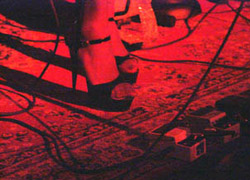
Read more GGW's "GUITARIST OF THE MONTH" Interviews
Go to Urban Productions Music & Arts Reviews
Return to Robert Urban Homepage